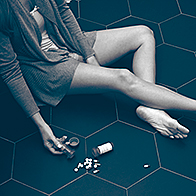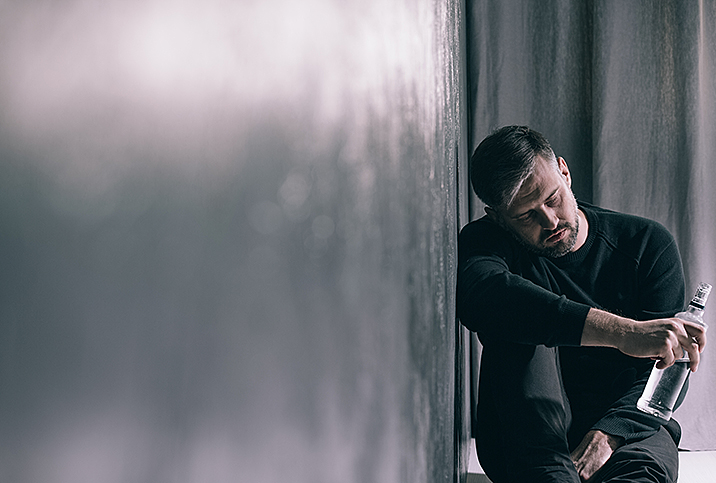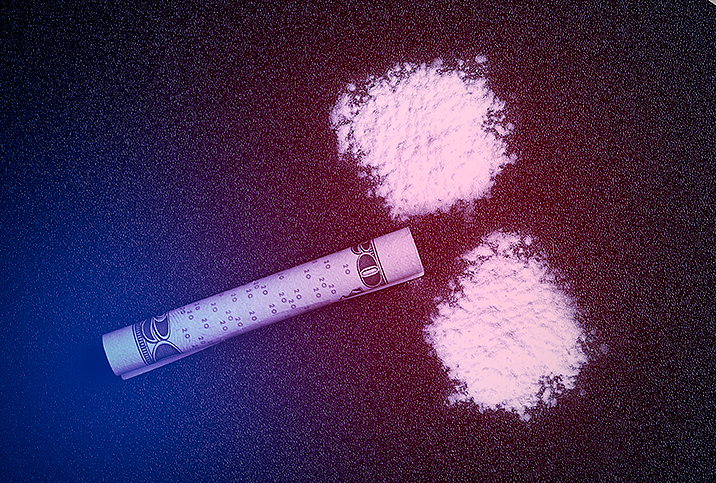How Sex Changed When I First Gave Up Drugs and Alcohol

I first realized that my relationship with sex had changed moments after returning home from rehab. And here's the kicker: I learned this by not having sex.
I'd just been driven home by my neighbor, a man—let's call him Fred—who I'd known for many years, a few times in the biblical sense. Not only had Fred been kind enough to make the long drive to and from Bastrop, Texas, to pick me up from rehab, but he'd watched my puppy and brought in my Amazon packages during the 30 days while I was away. And in between walking my dog and bringing in my mail, he'd apparently also found time to scatter my apartment with rose petals in a trail leading into my bedroom.
And for those unfamiliar with flower petal placement symbolism, the ole rose-petals-in-a-trail-to-your-bed move can really only mean one thing: Let's bone.
Sweating, exhausted and arms laden with my belongings, I looked down at the trail of rose petals snaking into my bedroom and felt a familiar sense of rising panic. Oh no, I thought. I bet these hard-to-sweep-up-looking rose petals were expensive. I guess I have to have sex with Fred.
Or did I?
Thirty days ago, Fred's grand, romantic, but totally unwanted, gesture would have successfully convinced me to politely but begrudgingly have sex with him (and then be mad at both him and myself for the next few weeks, possibly months, maybe forever).
But this was the newly rehabilitated, 30 days and 14 hours sober me. And so, with an uncharacteristically clear mind and freshly heightened sense of self-esteem, I politely but firmly declined Fred's suggestive flower petal offering. And you know what? I wasn't even that polite about it. (I mean, come on, bruh, I just got out of rehab.)
The complex relationship between substance abuse and sex
I can't help but worry that many of you reading this (especially those of you who have never dealt with addiction and who are also men) are unimpressed by what felt to me like a groundbreaking, fist-pump-worthy triumph.
But, as I'd just learned over the course of 30 days of group work, therapy and weeping under the smoker's pavilion, substance use disorder and a debilitating inability to say no to sex is a thing.
What I had long chalked up to moral failings ("I Cain't Say No!" has long been my favorite karaoke song) and plain-ole promiscuity might actually be better attributed to a complex web of genetic, social and behavioral factors. Or so I learned in rehab, where session after session was dedicated to parsing through subjects like self-esteem, people-pleasing and learning to say no.
What I had long chalked up to moral failings and plain-ole promiscuity might actually be better attributed to a complex web of genetic, social and behavioral factors.
A nearly irritating number of classes were also dedicated to discussing codependency, a psychological concept sometimes considered an addiction itself. Often characterized by difficulty communicating, an obsessive need for approval and paralyzing anxiety at even the thought of saying no, codependency is a concept that has recently earned a prominent place in addiction literature, and one that often co-occurs with substance abuse.
Combine this with other hallmarks of people with addiction problems—such as thrill-seeking and impulsivity—and then you add in the fact that alcohol and other drugs lower your inhibitions (making you more likely to behave in ways you normally wouldn't if you were sober), and suddenly you've got a perfect recipe for sexual behavior you might later regret.
First-time sobriety is a good time to reevaluate
That's what makes first-time sobriety a good time to reevaluate your relationship with sex, Kimberly May, LPC-S, LMFT, an Austin-based substance use therapist, told me.
"A big concern that people have when they're looking at changing or stopping their substance use is the ricochet of changes that it may have in their life—and certainly sex can be one of them," May said. "Question yourself: When you were using, was your sex life in line with who you are? Was it in line with your values? Was it in line with the lifestyle you want to lead?"
As I clumsily navigated sex in the early stages of sex in recovery—armed with freshly rehab-sharpened tools like communication and mindfulness—I noticed some major changes in the way I experienced sex. And according to May, you might experience some of these changes, too.
It might feel weird at first—but that goes away
Cranky morning sex aside, the bulk of my sexual experiences for the last decade had taken place while intoxicated. So when I did try having sober sex for the first time, it was clumsy and unnerving—might I even say scary?
Trying to parse through my foggy memories of intoxicated intercourse, I could only remember a whirl of grabbing, pinning and tearing off clothing. Now, sober, I found myself unsure of the steps and overthinking each one.
"Sober sex can sometimes feel intense or overwhelming or boring or awkward, but that doesn't tend to be permanent," May reassured me.
May likens the experience of having sex as a newly sober person to moving to a new city or getting a new job.
"Things all of the sudden feel different, nothing feels automatic, and everything feels like it requires a lot more thought," she said. "But—just as with moving to a new city or getting a new job—you eventually start acclimating and you don't have to think things through so much."
Orgasming feels really good.
I think even the most enthusiastic substance users would agree when I posit that there is nary an intoxicating substance out there that makes orgasming easier or better—though I will note that many believe that MDMA, cocaine and LSD make the overall sex experience more intense, although there are other issues of other concern with their use, not least of which might be doing jail time.
In fact, in my previous sexual life, I'd pretty much dismissed climaxing during two-person intercourse as neither necessary nor worth it. Orgasms were a thing that happened solo in my bathtub, not something I needed or expected or even wanted from my partner.
So when I, newly sober, started going for orgasms during sex—albeit somewhat skeptically and reluctantly—I was surprised and even kind of self-conscious about how good they felt.
After all, I'd spent a sexual lifetime climaxing as loudly and unbridled as I pleased with only the next-door neighbors to worry about, so I felt vulnerable and maybe even a little guilty to be doing what had been this intensely private thing in front of another human being.
Luckily, I found it difficult to continue being self-conscious during increasingly bedframe-rattling orgasms.
Sex might—but not necessarily—undermine your recovery
Anyone who's been part of a 12-step program or has seen the 2000 movie "28 Days" knows some version of the so-called "One-Year Rule"—that is, no relationships during your first year of recovery. (Or, in the case of "28 Days," until you've successfully kept a plant alive for six months, and then a pet for another six months.)
However, May warns against giving too much credence to absolutes like these. "Anything that touts something as 'always' and 'never' when it comes to things like sex and dating tends to be overgeneralized and doesn't take individual differences into account," she said.
But could having sex or entering a relationship too early undermine your recovery? Might you, in theory, be at risk of swapping out one vice for another?
"Sure," said May. "But we could also say that for gambling or spending money or any high-dopamine activity."
When trying to make a decision about whether to engage in sexual activity, May also suggests trying to imagine yourself waking up tomorrow.
"We tend to be very focused on our immediate self and very callous with our tomorrow self," May explained. "We don't always give a lot of thought to how our tomorrow self is going to feel. We do this with food, we do this with substances and we do this with sex."




















